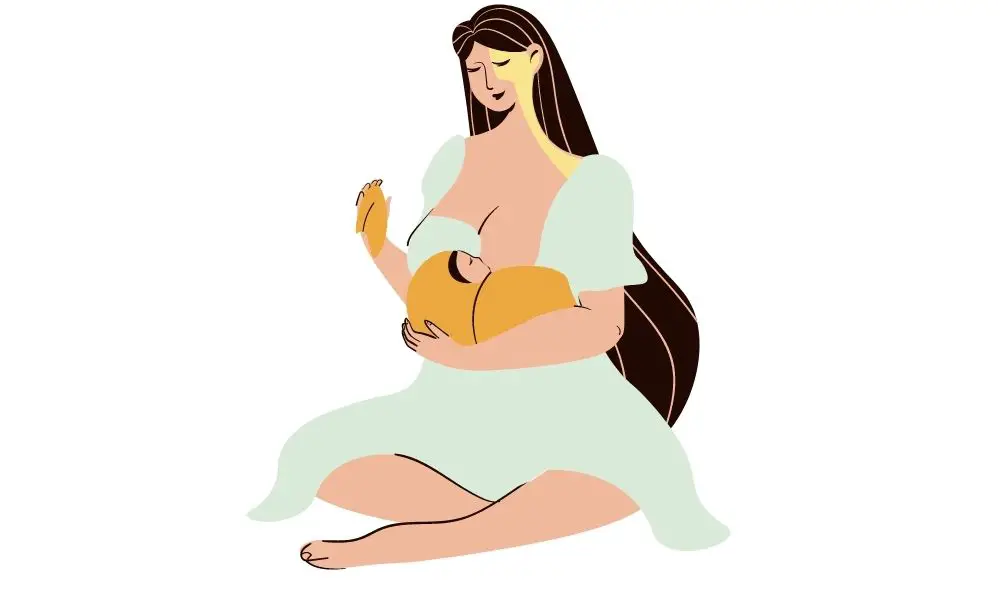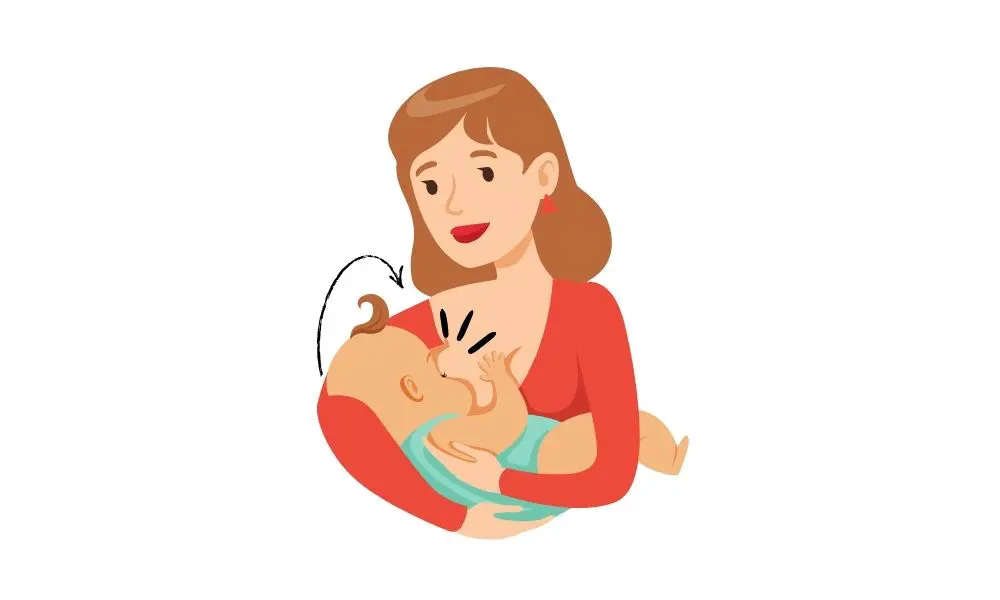How to stop baby from biting nipple?
Ouch! Getting bitten by your baby during breastfeeding can be a very painful experience. But why do babies bite nipple? And how to stop baby from biting nipple? Before mentioning the reasons, you should know that quickly pulling or yelling them isn’t the ideal strategy to cope with this breastfeeding problem!
The reality is that every mom has been bitten once while breastfeeding their baby. Bitting Niplle is a passing phase, and it passes, but this might not be the reason to stop breastfeeding your baby up to the age of six months. Because there are many solutions to deal with your baby bitting.
Biting nipple is a common behavior seen in babies, but some babies never bite. And most babies do it, especially when they are teething. It is a temporary situation for mothers that often lasts only a few days or a couple of weeks.
You must talk to your doctor or a lactation consultant if your baby bitting nipple more often. Since there are many reasons why your baby is biting while breastfeeding, sometimes it can be due to their teething or certain breastfeeding positions.
Most people think when the baby gets teeth, they starts bite, they should stop breastfeeding the baby. Not true! Remember that babies can’t nurse and bite simultaneously because the tongue covers the bottom teeth when your baby is nursing.
Why do babies start bite nipple during breastfeeding?
Placing the baby close to the breasts and keeping their mouth open can reduce the risk of biting. If you suddenly push your baby after they bite you, they might bite you even harder. So make sure you remove gently the baby from your nipple.
Here are a few reasons mentioned why your baby might bite you during breastfeeding:
- Teething: Teething can be the most common reason for the nipple bite. Because teething makes the gums sore, and bitting may relief baby’s gums.
- Too little breast milk: Less supply of breast milk can make them frustrated and more hungry, which can be resulte in nipple bitting.
- Too fast-flowing milk: Babies can become overactive during breastfeeding by fast milk flow and may bite you accidentally.
- Attention seeking: Babies are attention seekers. When mothers do not give them the required attention or talk to someone else, they may bite you.
- Boredom: Sometimes babies get distracted or bored and bite you unknowingly.
- Fall asleep: It is important to notice when your baby is sleeping during the breastfeeding process, so their jaw doesn’t clasp on the nipple. I
- Ear infection or cold: Babies suffering from cold might get problems swallowing and sucking, which may lead them to bite you.
Is it necessary babies should weaned after teething?
No, it isn’t? Teething in babies don’t mean that you should not wean your baby. You must know what is Weaning but It’s a myth that teeth contribute to nipple bitting. Babies suck the breastmilk through their tongue and lips only. They never use their teeth while breastfeeding.
The only thing will happened after baby have teeth, babies may change their latch. Now it is your duty to support them to get proper latch. Here are a few breastfeeding position that help you more.
Prepare your baby for a deep latch, encourge baby to suck on your aerola not the whole nipple.
How Do I Stop Baby From biting Nipple Druing Breastfeeding?

Baby biting can be easily controlled and prevented with simple methods. So, thinking to switch your baby for expressed milk is not an ideal way to cope with nipple biting. Below are a few ways to stop baby from biting nipple during breastfeeding:
- Say ‘NO’ when the baby bites: When your baby bites you for the first time, say politely, “No, No biting, mommy,” so that the baby may not get frightened and continue to feed. Do not stop breastfeeding your baby, and ask them in a calm voice.
- End breastfeeding: If your baby bites you continuously, say “No” and stop feeding them. This situation might help them understand that biting is not acceptable. It would help if you calmly took them off the breast until they learn to provide without biting.
- Offer something to chew: This method is especially for babies going through teething. Biting can be reduced when you offer them something to chew before breastfeeding, like a chewing ring or a cold or wet clean cloth.
- Please pay attention: Babies are attention seekers, and giving them enough time and paying them proper attention may help reduce the risk of biting. Make sure your baby is swallowing and sucking properly. Pay attention to your baby while breastfeeding, as the probability of biting is low during the active feeding of the baby.
- Do not feed when they are sleepy or lazy: Remember you should never feed your baby when they are exhausted as it may increase the chance of accidental biting. The best time to feed your baby is when they are active.
- Ensure a proper latch: Make sure your baby’s lips are wide open and their tongue cups around your nipple. The tongue will also cover the gums in a good latch, preventing the baby from biting and making it impossible to chew.
- Change feeding positions: If the baby continues to bite, you may try changing the breastfeeding positions. You can try a laid-back breastfeeding position to reduce the scratches from the baby’s teeth.
- Keep a finger near their mouth: You can try keeping a finger in their mouth as this may help remove their latch easily when they start biting.
- Feed frequently: Feeding the baby more regularly can maintain the milk flow fast, reducing your baby’s risk of getting bitten.
- End feeding when the sucking is slow: Babies mostly bite you when the milk flow slows during breastfeeding, and you should end the feeding when they start sucking slowly.
Nipple damage due to baby biting
Baby Biting may cause damage to your nipples. Fortunately, this never happens to most moms, but generally, a mom can get a bad bite, which can be quite painful for her. Here are some treatments that you can do to treat your nipple damage.
- Saline rinses: Saltwater is natural, and it heals your skin. Try slowly massaging your nipples with salt water, as it can be very soothing for your nipples.
- Nipple creams: There are variety of nipple creams available on chemist shop, but they only work if there is a cut on your nipple. It helps heal the cuts.
- Pain relievers: When your baby bite hurts you or it’s more painful, you can consult your lactation expert and use a pain reliever to lessen the suffering.
- Cold packs: Using cold iced packs can help you with the pain in your nipple and can make your nipples soothe.
- Don’t feed on the damaged side: It can be very painful to feed your baby from the damaged side as they suck vigorously once they start feeding. Give your damaged nipple some time to heal. Meanwhile, provide from the other side of your breasts.
- Express your milk from damaged nipple: You have to express milk from damage nipple to save yourself from any engorgement. You must know the breastfeeding problems to avoid all these problems.
Below are important questions and their answers new breastfeeding moms want to know:-
Why does my baby bite my nipple?
When you have a low milk supply, this may irritate your waiting baby and he starte to bits your nipple. The best tip is to squees your breast that help milk supply to flow normally. Exclusive pumping also maintain a good milk supply.
Try to change on other side after a specific time period as babyies get bored on the same sesseion.
Bottom line
When your baby starts biting you, it can be frustrating, especially if the bites are leaving cuts or marks on your skin.
If you get a big bad bite, applying ice can be very helpful. Try avoiding breastfeeding your baby from the damaged nipples until your nipples are properly healed.
The suggestions above can be very helpful to you, and to ignore more bites, you should consult your lactation counselor to figure out if there’s anything wrong with feeding.
